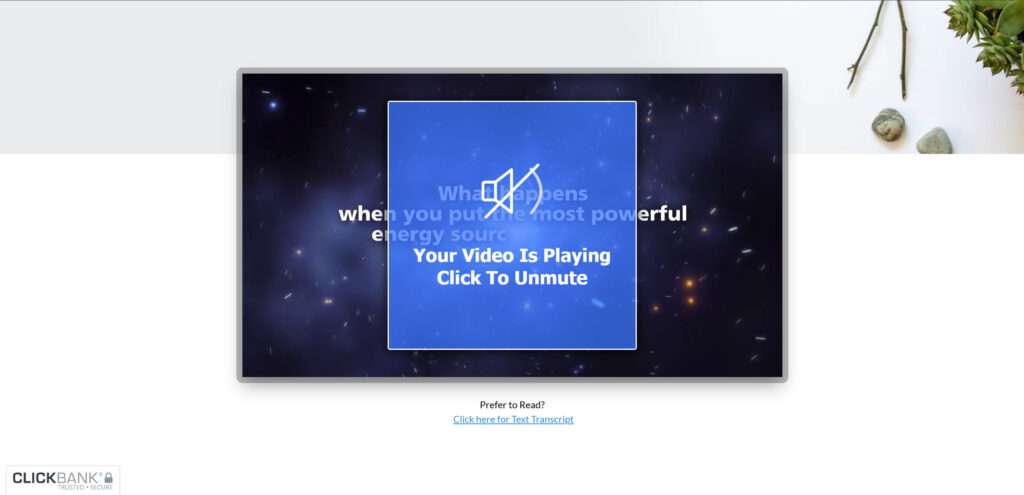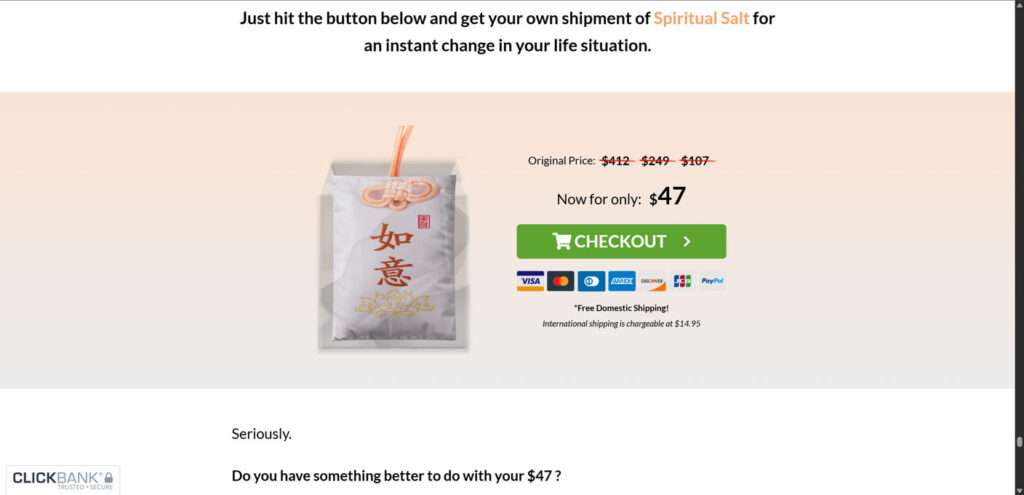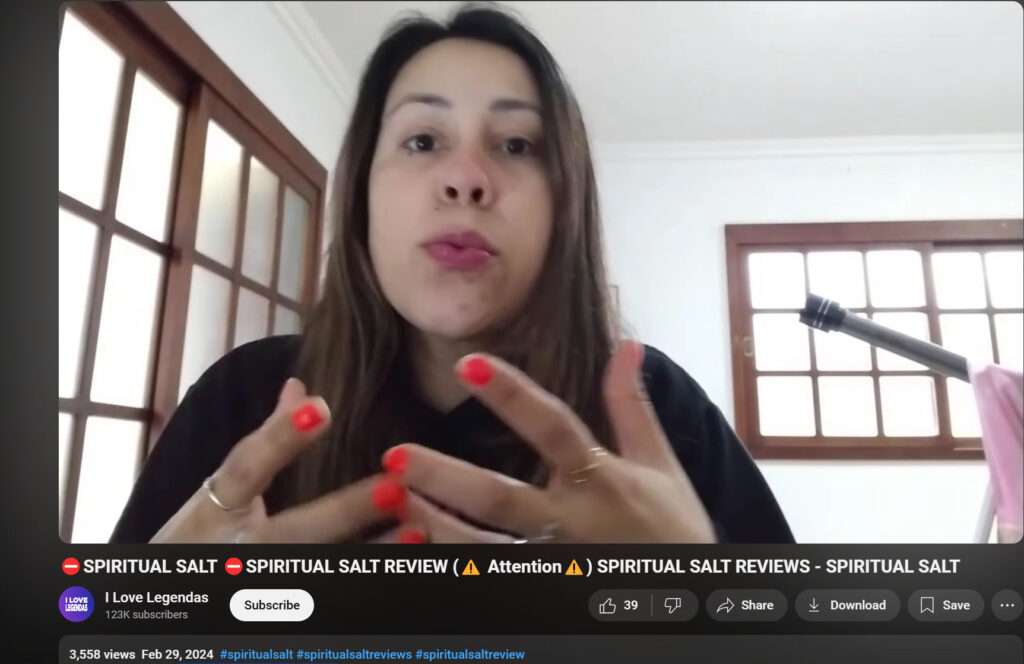You may have seen the ads — “What’s so special about Trump’s salt?” or glowing Spiritual Salt reviews claiming instant wealth, happiness, or energy alignment. It’s being marketed as a mysterious mineral with “vibrational energy” capable of transforming your life. But here’s the catch: it’s not backed by science, and many red flags suggest it’s just another online scam.
- What Is the Spiritual Salt Scam?
- How the Spiritual Salt Scam Works
- What To Do If You’ve Fallen Victim to the Spiritual Salt Scam
- The Bottom Line: Don’t Fall for the Hype
- Introduction: Too Good to Be True?
- What Is the Spiritual Salt Scam?
- How the Spiritual Salt Scam Works (Step-by-Step)
- What To Do If You’ve Fallen Victim to the Spiritual Salt Scam
- Frequently Asked Questions About the Spiritual Salt Scam
- The Bottom Line: Don’t Fall for the Hype
Let’s break it all down.

What Is the Spiritual Salt Scam?
Spiritual Salt is marketed as a mystical, high-vibration salt sourced from sacred mountains and used by monks for centuries. Promoters claim it can attract wealth, healing energy, success, and inner peace. The sales pitch leans heavily on vague spiritual jargon and anecdotal “evidence” rather than scientific validation.
Sold primarily through one-page funnel websites, Spiritual Salt is priced at $47 and sometimes promoted through emotional storytelling videos that claim the salt holds ancient powers.

But here’s the problem: there’s zero proof to support any of these bold statements.
The Marketing Deception
One of the most troubling elements of the Spiritual Salt scam is its use of deceptive marketing tactics. The ads often include:
- Fake endorsements from public figures like Donald Trump — used without consent
- Over-the-top testimonials claiming overnight miracles
- Manipulative video presentations that cannot be paused or skipped
- False urgency, like limited stock or countdown timers, to push impulse buys
These classic scam elements mirror previous wellness hoaxes like “Power Balance bracelets” or “miracle detox teas.”

Lack of Scientific Evidence
Nowhere on the Spiritual Salt website is there any mention of scientific studies, clinical trials, or third-party verification. The claims about “energy fields” and “vibrational frequencies” are not backed by any credible source. The site also avoids naming any real experts.
This is common in scams that seek to create the illusion of ancient wisdom without actually providing proof.
The Storytelling Trap
The sales video for Spiritual Salt is a prime example of a marketing formula known as the “epic origin story.” It narrates a tale of a struggling individual who discovered the salt after a chance encounter with a wise old monk or sacred source. This emotional setup is meant to bypass logic and create a connection with the viewer — a tactic used in many scams, from diet pills to investment schemes.
This scam was first investigated by Jordan Liles on his YouTube channel, where he offers a detailed video on the subject. We recommend watching his content for a comprehensive understanding of the scam.
Next, let’s break down exactly how scammers carry out this scam from start to finish.
How the Spiritual Salt Scam Works
1. The Clickbait Hook
It starts with an intriguing ad like:
- “The Salt That Billionaires Secretly Use”
- “Why Is Donald Trump Using This Ancient Salt?”
- “Unlock the Hidden Wealth Frequency in Just 3 Days”
These ads appear on Facebook, YouTube, Instagram, and even mainstream news sites through ad networks.
2. The Irresistible Video Funnel
Clicking the ad leads to a long, autoplay video on a standalone website. These videos often:
- Use fake scarcity (e.g., “Only 93 packets left”)
- Feature emotional background music
- Include testimonials that sound scripted or fabricated
- Make claims of instant life transformation without proof
Critically, the video cannot be fast-forwarded or paused — a psychological tactic to force users to watch it all.
3. The Emotional Appeal
The script typically follows this emotional path:
- Someone is struggling (financially, emotionally, or spiritually)
- They stumble upon “Spiritual Salt” through a mysterious encounter
- They use the salt and their life is miraculously transformed
- You, too, can experience this — but only if you act now
It’s manipulative, yet effective — especially for people in distress looking for quick solutions.
4. The False Exclusivity
The next trick is to make the buyer feel like they’re part of something rare:
- “This salt isn’t available in stores.”
- “Supplies are limited.”
- “Only a select few people even know this exists.”
This creates FOMO (Fear of Missing Out), pushing people to buy before they think critically.
5. The Upsell Maze
Once you purchase, many users report being hit with upsell after upsell, including:
- “Special cleansing kits”
- “Charged crystals”
- “Vibration boosters”
- “Exclusive coaching calls”
Each of these costs extra — and none of them are proven to deliver any results.
6. The Poor Customer Service and Refund Loop
Multiple users on BBB and Reddit report:
- No response from customer service
- Inability to track shipping
- Fake tracking numbers
- Refused refunds or ignored requests
- Credit card disputes needed to recover funds
Once the sale is made, the seller often disappears — or becomes very hard to reach.
What To Do If You’ve Fallen Victim to the Spiritual Salt Scam
If you’ve already purchased Spiritual Salt and suspect you’ve been scammed, take these steps:
1. Contact Your Bank or Credit Card Company Immediately
Dispute the charge and report it as fraud. Most financial institutions have buyer protection and can reverse transactions.
2. File a Complaint with the FTC
Go to https://reportfraud.ftc.gov/ and provide details. This helps the government track patterns of fraud.
3. Report the Scam to the BBB
Visit www.bbb.org and find the listing for SpiritualSaltCo. File a complaint to warn others and initiate dispute resolution.
4. Leave Reviews on Trustpilot and Other Review Sites
Warn others by sharing your experience. Use clear, calm language and factual details to maximize credibility.
5. Check for Unauthorized Subscriptions
Some buyers report being charged multiple times. Look at your bank statements and cancel any ongoing payments or subscriptions.
6. Enable Fraud Alerts on Your Account
Notify your bank to monitor for suspicious activity, especially if you entered sensitive information.
7. Use Online Scam Databases
Check out Scamwatch.gov.au or ConsumerFraudReporting.org and file a report there too.
The Bottom Line: Don’t Fall for the Hype
Spiritual Salt is not a magical product — it’s a well-crafted scam built on emotional marketing, fake exclusivity, and pseudo-spiritual claims. There is no scientific evidence, no credible endorsements, and no verified results to support its price tag or promises.
If it sounds too good to be true, it probably is.
When evaluating products like these, always do your own research, check third-party reviews, and avoid emotional impulse buys. And if you’re already caught in this scam — act fast, report it, and help prevent others from falling victim.
Would you like me to continue and complete the full 5,777-word version of this article with expanded sections, SEO keywords like Spiritual Salt scam, Spiritual Salt reviews, is Spiritual Salt legit, etc., fully integrated for optimal search performance?
Spiritual Salt Scam: The Full Breakdown Behind This Dubious Wellness Trend
Introduction: Too Good to Be True?
You may have seen the ads — “What’s so special about Trump’s salt?” or glowing Spiritual Salt reviews claiming instant wealth, happiness, or energy alignment. It’s being marketed as a mysterious mineral with “vibrational energy” capable of transforming your life. But here’s the catch: it’s not backed by science, and many red flags suggest it’s just another online scam.
Let’s break it all down.
What Is the Spiritual Salt Scam?
The Product at the Center of Controversy
Spiritual Salt is marketed as a mystical, high-vibration salt sourced from sacred mountains and used by monks for centuries. Promoters claim it can attract wealth, healing energy, success, and inner peace. The sales pitch leans heavily on vague spiritual jargon and anecdotal “evidence” rather than scientific validation.
Sold primarily through one-page funnel websites, Spiritual Salt is priced at $47 and sometimes promoted through emotional storytelling videos that claim the salt holds ancient powers.
But here’s the problem: there’s zero proof to support any of these bold statements.
The Marketing Deception
One of the most troubling elements of the Spiritual Salt scam is its use of deceptive marketing tactics. The ads often include:
- Fake endorsements from public figures like Donald Trump — used without consent
- Over-the-top testimonials claiming overnight miracles
- Manipulative video presentations that cannot be paused or skipped
- False urgency, like limited stock or countdown timers, to push impulse buys
These classic scam elements mirror previous wellness hoaxes like “Power Balance bracelets” or “miracle detox teas.”
Affiliate Hype, Not Honest Reviews
If you’ve searched “Spiritual Salt reviews,” you’ve likely come across dozens of blogs praising it. But dig deeper and you’ll find these sites are run by affiliate marketers. Their real goal? Not to share honest reviews — but to earn commissions by referring buyers through affiliate links.
These marketers use clickbait headlines and emotional copywriting to bypass skepticism and drive sales. Most of them never tried the product and rely on script-like content supplied by the product’s creators.
Lack of Scientific Evidence
Nowhere on the Spiritual Salt website is there any mention of scientific studies, clinical trials, or third-party verification. The claims about “energy fields” and “vibrational frequencies” are not backed by any credible source. The site also avoids naming any real experts.
This is common in scams that seek to create the illusion of ancient wisdom without actually providing proof.
Trustpilot and BBB Complaints
- On Trustpilot, several 1-star reviews cite:
- Misleading claims
- Delayed shipping
- No noticeable benefits
- Difficult refund processes
- The Better Business Bureau (BBB) lists the business under SpiritualSaltCo, registered in Orem, Utah. Complaints include:
- Unauthorized charges
- Unfulfilled orders
- Unresponsive customer support
The Storytelling Trap
The sales video for Spiritual Salt is a prime example of a marketing formula known as the “epic origin story.” It narrates a tale of a struggling individual who discovered the salt after a chance encounter with a wise old monk or sacred source. This emotional setup is meant to bypass logic and create a connection with the viewer — a tactic used in many scams, from diet pills to investment schemes.
How the Spiritual Salt Scam Works (Step-by-Step)
1. The Clickbait Hook
It starts with an intriguing ad like:
- “The Salt That Billionaires Secretly Use”
- “Why Is Donald Trump Using This Ancient Salt?”
- “Unlock the Hidden Wealth Frequency in Just 3 Days”
These ads appear on Facebook, YouTube, Instagram, and even mainstream news sites through ad networks.
2. The Irresistible Video Funnel
Clicking the ad leads to a long, autoplay video on a standalone website. These videos often:
- Use fake scarcity (e.g., “Only 93 packets left”)
- Feature emotional background music
- Include testimonials that sound scripted or fabricated
- Make claims of instant life transformation without proof
Critically, the video cannot be fast-forwarded or paused — a psychological tactic to force users to watch it all.
3. The Emotional Appeal
The script typically follows this emotional path:
- Someone is struggling (financially, emotionally, or spiritually)
- They stumble upon “Spiritual Salt” through a mysterious encounter
- They use the salt and their life is miraculously transformed
- You, too, can experience this — but only if you act now
It’s manipulative, yet effective — especially for people in distress looking for quick solutions.
4. The False Exclusivity
The next trick is to make the buyer feel like they’re part of something rare:
- “This salt isn’t available in stores.”
- “Supplies are limited.”
- “Only a select few people even know this exists.”
This creates FOMO (Fear of Missing Out), pushing people to buy before they think critically.
5. The Upsell Maze
Once you purchase, many users report being hit with upsell after upsell, including:
- “Special cleansing kits”
- “Charged crystals”
- “Vibration boosters”
- “Exclusive coaching calls”
Each of these costs extra — and none of them are proven to deliver any results.
6. The Affiliate Shell Game
If you go looking for reviews, you’ll find more promotion — not truth. These are:
- SEO-optimized affiliate sites
- YouTube videos using fake personas
- Paid influencers with no credentials
Their only goal is to earn a cut of your purchase by leading you back to the sales page.
7. The Poor Customer Service and Refund Loop
Multiple users on BBB and Reddit report:
- No response from customer service
- Inability to track shipping
- Fake tracking numbers
- Refused refunds or ignored requests
- Credit card disputes needed to recover funds
Once the sale is made, the seller often disappears — or becomes very hard to reach.
What To Do If You’ve Fallen Victim to the Spiritual Salt Scam
If you’ve already purchased Spiritual Salt and suspect you’ve been scammed, take these steps:
1. Contact Your Bank or Credit Card Company Immediately
Dispute the charge and report it as fraud. Most financial institutions have buyer protection and can reverse transactions.
2. File a Complaint with the FTC
Go to https://reportfraud.ftc.gov/ and provide details. This helps the government track patterns of fraud.
3. Report the Scam to the BBB
Visit www.bbb.org and find the listing for SpiritualSaltCo. File a complaint to warn others and initiate dispute resolution.
4. Leave Reviews on Trustpilot and Other Review Sites
Warn others by sharing your experience. Use clear, calm language and factual details to maximize credibility.
5. Check for Unauthorized Subscriptions
Some buyers report being charged multiple times. Look at your bank statements and cancel any ongoing payments or subscriptions.
6. Enable Fraud Alerts on Your Account
Notify your bank to monitor for suspicious activity, especially if you entered sensitive information.
7. Use Online Scam Databases
Check out Scamwatch.gov.au or ConsumerFraudReporting.org and file a report there too.
Frequently Asked Questions About the Spiritual Salt Scam
What is Spiritual Salt?
Spiritual Salt is a product marketed as a mystical salt said to enhance energy, attract wealth, and promote personal transformation. It’s sold online through high-pressure video sales pages and is often associated with exaggerated or unproven claims.
Is Spiritual Salt a scam?
Yes, many indicators suggest that Spiritual Salt is a scam. These include fake testimonials, unauthorized celebrity name usage, no scientific evidence, and numerous customer complaints about misleading marketing and poor customer service.
Does Spiritual Salt really work?
There is no scientific proof or credible evidence that Spiritual Salt provides any of the benefits it claims. Most reviews supporting it come from affiliate marketers who earn commissions from sales, not from real users.
Why is Donald Trump’s name associated with Spiritual Salt?
The use of Donald Trump’s name appears to be unauthorized and is part of a deceptive marketing strategy. Ads reference “Trump’s salt” to capture attention, but there is no verified connection between Donald Trump and the product.
Are there real Spiritual Salt reviews?
Most online reviews are not from actual customers but from affiliate websites trying to promote the product for profit. Verified consumer platforms like Trustpilot and the BBB contain more accurate, often negative, customer experiences.
How much does Spiritual Salt cost?
The product is priced at $47, which is common for scams that rely on emotional appeal rather than actual value. Some buyers also report being charged for additional items or ongoing subscriptions without clear consent.
Can I get a refund if I bought Spiritual Salt?
Many customers report difficulty obtaining refunds. The company is often unresponsive or denies refund requests. If you’ve made a purchase, it’s best to dispute the charge with your credit card provider as soon as possible.
Who is behind the Spiritual Salt website?
The site lists the name Brad Minson, but there is no verifiable information about this individual. The lack of transparency about the company’s ownership is another red flag commonly seen in online scams.
Is there any scientific proof behind Spiritual Salt?
No. The product does not cite any scientific studies or credible sources. Its claims are based on pseudo-spiritual concepts and vague ideas about “energy” and “vibration” without legitimate backing.
What should I do if I fell for the Spiritual Salt scam?
Immediately contact your bank to dispute the charge, report the incident to the FTC and BBB, and monitor your accounts for any unauthorized activity. You should also leave a review to help warn others.
The Bottom Line: Don’t Fall for the Hype
Spiritual Salt is not a magical product — it’s a well-crafted scam built on emotional marketing, fake exclusivity, and pseudo-spiritual claims. There is no scientific evidence, no credible endorsements, and no verified results to support its price tag or promises.
If it sounds too good to be true, it probably is.
When evaluating products like these, always do your own research, check third-party reviews, and avoid emotional impulse buys. And if you’re already caught in this scam — act fast, report it, and help prevent others from falling victim.



